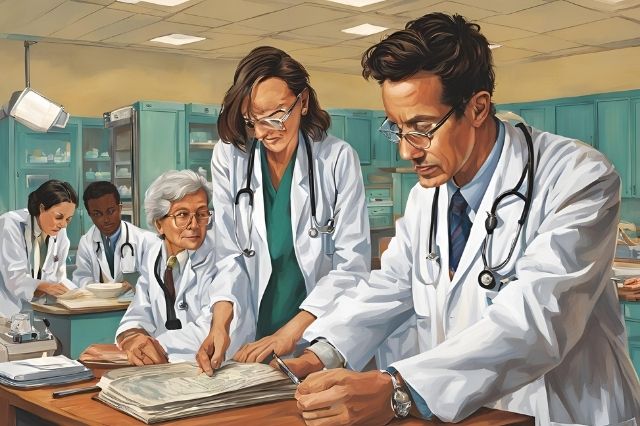Are you considering a career in medicine and wondering what it takes to become a doctor? The journey into the world of medicine is both challenging and rewarding, and it starts with making informed decisions at every step. From choosing the right medical school to establishing a successful medical career, there are many important stages to navigate. In this ultimate guide, we will delve into each of these stages and provide you with valuable insights and practical tips to help you along the way. Whether you’re a high school student exploring your options or a college graduate preparing for the next chapter, this guide is designed to be your roadmap to success in the medical field. So, let’s start this journey together and uncover the essential steps to becoming a doctor.
Table of Contents
Choosing the Right Medical School
When choosing the right medical school, it is important to consider factors such as location, curriculum, and campus culture. You will want to find a school that aligns with your personal and academic goals, as well as provides the resources and support you need to succeed in your medical education.
Researching different medical schools and their programs can help you make informed decisions. Consider the class size, faculty-to-student ratio, and available opportunities for research and clinical experience. It’s also important to find a school with a curriculum that matches your learning style and interests, whether that’s problem-based learning, traditional lectures, or a combination of both.
Furthermore, exploring the campus culture and student life can give you insights into the overall environment of the medical school. Consider factors such as diversity, student organizations, and support services for students, as these can all impact your experience and well-being during your time in medical school.
Ultimately, choosing the right medical school is a personal decision that requires careful consideration of various factors. By researching and visiting different schools, you can find the best fit for your medical education and future career as a healthcare professional.
Understanding the Medical School Admissions Process
Applying to medical school can be a daunting process, but understanding the admissions process can make it seem more manageable. The first step is to research different medical schools and their admission requirements. Each school may have different prerequisites, so it’s important to have a clear understanding of what is expected.
Once you have a list of potential schools, the next step is to prepare for and take the MCAT. This standardized test is a crucial component of the admissions process and will likely have a significant impact on your application. It’s important to allocate enough time to study and prepare thoroughly for the exam.
After taking the MCAT, the next step is to gather letters of recommendation, write a personal statement, and complete the application process. This often involves submitting transcripts, a resume, and any other required documents. It’s important to pay close attention to deadlines and ensure all materials are submitted on time.
Finally, after submitting your application, you may be invited to interview at different medical schools. It’s important to prepare for these interviews, as they can play a significant role in the admissions decision. By understanding each step of the admissions process and preparing thoroughly, you can increase your chances of being accepted to the medical school of your choice.
Navigating Medical School Curriculum
One of the most crucial aspects of navigating medical school curriculum is understanding the various courses and subjects that you will be required to master. With a diverse range of topics including anatomy, biochemistry, physiology, pathology, pharmacology, and more, it can be overwhelming to keep up with the rigorous demands of medical education.
As a medical student, it is essential to develop effective study habits and time management skills to navigate through the extensive curriculum. Creating a well-structured schedule and setting realistic goals can help you stay on track and maintain a healthy work-life balance while pursuing your medical degree.
In addition to coursework, navigating medical school curriculum also involves seeking out additional learning resources such as study groups, tutoring, and educational workshops. Utilizing these resources can enhance your understanding of complex topics and provide you with valuable support from peers and faculty members.
Furthermore, staying updated with the latest advancements in medical research and technological innovations is crucial for navigating the ever-evolving landscape of medical education. Engaging in extracurricular activities, attending conferences, and participating in research projects can broaden your knowledge and enrich your learning experience throughout medical school.
Mastering the Art of Clinical Skills
Mastering clinical skills is an essential part of becoming a successful medical professional. It requires dedication, practice, and a willingness to continually improve. Clinical skills encompass a wide range of abilities, from taking patient histories to performing physical exams and honing diagnostic reasoning.
One of the key components of mastering clinical skills is hands-on experience. This can be gained through clinical rotations, where students have the opportunity to work directly with patients under the supervision of experienced physicians. It’s important to take full advantage of these opportunities and actively seek out learning experiences to build on your clinical skills.
Additionally, observation and mentoring play a crucial role in mastering clinical skills. Observing experienced healthcare professionals in action and seeking out mentors who can provide guidance and feedback can greatly accelerate the learning process.
Continuous self-assessment is also important when it comes to mastering clinical skills. It’s essential to regularly reflect on your strengths and weaknesses, seek feedback from peers and mentors, and actively work to improve in areas where you may be lacking.
Gaining Hands-on Experience through Clinical Rotations
One of the most valuable aspects of medical school is the opportunity to gain hands-on experience through clinical rotations. This invaluable experience allows medical students to apply their theoretical knowledge in a real-world setting, working alongside experienced healthcare professionals.
During clinical rotations, students have the chance to interact with patients, diagnose illnesses, and develop treatment plans under the supervision of physicians. This hands-on experience is crucial for developing clinical skills and gaining a deeper understanding of the practice of medicine.
Furthermore, clinical rotations provide an opportunity for students to explore different specialties and gain a better understanding of the various career paths available in medicine. It allows them to identify their areas of interest and develop a network of contacts in the field.
Overall, clinical rotations are an essential component of medical education, providing students with the opportunity to gain hands-on experience, develop clinical skills, and explore potential career paths in the field of medicine.
Preparing for USMLE Step Exams
Studying for the USMLE Step exams can be a daunting task for many medical students. These exams are a crucial part of the process of becoming a licensed physician in the United States. It is important to approach the preparation for these exams with a well-organized plan and a clear understanding of the material that will be covered.
One of the first steps in preparing for the USMLE Step exams is to familiarize yourself with the format and content of each exam. The exams are divided into three steps, each of which assesses different aspects of medical knowledge and clinical skills. Step 1 focuses on basic scientific concepts, Step 2 covers clinical knowledge and skills, and Step 3 is a multi-day exam that assesses the ability to apply medical knowledge and understanding of biomedical and clinical science to patient care. Understanding the format and content of each exam is essential to creating an effective study plan.
Once you have a clear understanding of the exams, it is important to gather high-quality study materials. This may include review books, question banks, and online resources. Many students find it helpful to create a study schedule that breaks down the content to be covered each day, allowing for thorough review of all material without becoming overwhelmed.
In addition to individual study, many students find it beneficial to participate in group study sessions or review courses. These can provide an opportunity to discuss difficult concepts, practice clinical skills, and receive valuable feedback from peers and instructors. Utilizing a variety of study methods can assist in solidifying understanding of the material and building confidence as the exam date approaches.
Exploring Specialties in Medicine
When pursuing a career in medicine, it’s important to understand the wide range of specialties available to medical professionals. From cardiology to orthopedics to pediatrics, there are numerous paths to choose from, each with its own unique challenges and rewards.
Exploring these specialties is crucial for aspiring physicians to find the right fit for their skills, interests, and long-term career goals. Shadowing practicing doctors, attending clinical rotations in various departments, and participating in informational interviews with professionals in different fields are all valuable ways to gain insight into the diverse array of medical specialties.
Understanding the day-to-day responsibilities, patient populations, and treatment modalities of each specialty can help medical students make informed decisions about their future careers. Whether it’s the fast-paced environment of the emergency department or the precision and focus required in surgical specialties, it’s important to explore these options thoroughly before committing to a specific path.
By engaging with different specialties, medical students can expand their knowledge, develop a deeper understanding of the healthcare industry, and ultimately make more informed decisions about their future careers.
Applying for Residency Programs
Applying for residency programs can be a daunting task for medical students who are eager to take the next step in their career. The process involves careful consideration of various factors, including the applicant’s qualifications, personal statement, letters of recommendation, and interview performance.
It is essential for aspiring residents to thoroughly research the different programs they are interested in and to tailor their applications accordingly. This may involve assessing the program’s curriculum, faculty, and location, as well as understanding the program’s specific requirements and deadlines.
Additionally, candidates should ensure that their application materials, such as their CV and personal statement, effectively showcase their strengths, experiences, and career goals. The personal statement, in particular, offers an opportunity for applicants to highlight their unique attributes and explain why they are a good fit for the program.
Lastly, preparing for residency interviews is crucial in order to make a positive impression on program directors and faculty members. This may include practicing common interview questions, researching the program, and honing one’s communication skills to effectively articulate their passion for their chosen specialty.
Surviving the Rigors of Residency
Surviving the rigors of residency can be a daunting challenge, but with the right mindset and strategies, it is possible to not only survive, but thrive during this demanding period of medical training. One of the key strategies for surviving residency is to prioritize self-care. This includes getting enough rest, eating well, and making time for activities that bring joy and relaxation.
Another crucial aspect of surviving residency is to cultivate a strong support network. This can include peers in the program, mentors, and mental health professionals. Having a support system in place can provide much-needed encouragement and guidance during challenging times.
In addition, it’s important for residents to set boundaries and practice time management. Residency can be all-consuming, but it’s essential to carve out time for personal interests, relationships, and hobbies. This can help prevent burnout and maintain a sense of balance in life.
Lastly, maintaining a growth mindset and seeking opportunities for learning and development can help residents not only survive, but flourish during their residency. Embracing challenges as opportunities for growth and remaining open to new experiences can make the residency journey more fulfilling and rewarding.
Establishing a Successful Medical Career
Establishing a successful medical career is a goal that many aspiring physicians strive for. It requires a combination of hard work, dedication, and ongoing professional development to achieve long-term success in the medical field. Whether you are a medical student, resident, or practicing physician, there are several key steps that can help you establish and maintain a successful career in medicine.
First and foremost, choosing the right medical school and excelling in your studies is essential for laying a solid foundation for your future career. Medical schools with strong reputations and rigorous academic programs can provide you with the knowledge and skills needed to succeed in the medical field.
Once you have completed medical school, applying for residency programs is the next crucial step in establishing a successful medical career. Residency training provides hands-on experience and specialized training in a specific area of medicine, laying the groundwork for your future practice.
Additionally, lifelong learning and staying updated on the latest medical advances and best practices are essential for navigating medical school curriculum and staying competitive in the ever-evolving healthcare landscape. Establishing a successful medical career requires ongoing dedication to professional development and continuous learning.





